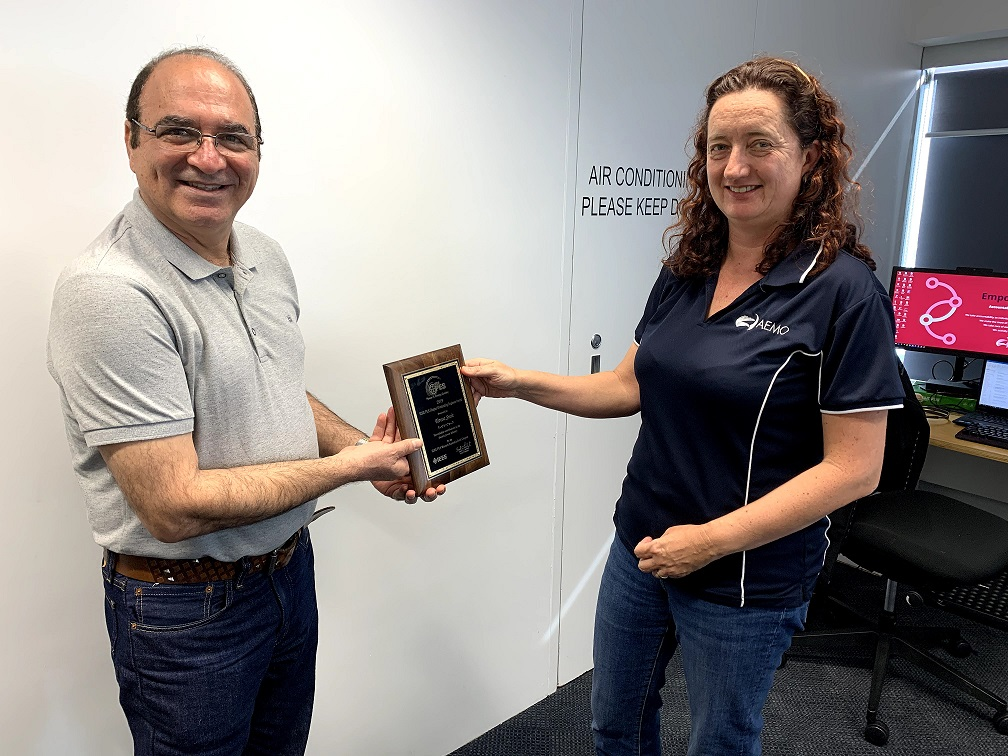20201 News Archive
18 November 2021: IEEE PES Webinar on 'Frequency Stability and Resilience Supports from Hydrogen Electrolysers'
The IEEE PES/PELS WA Chapter is organising a webinar by Mehdi Ghazavi Dozein.
There are major discussions worldwide, and particularly in Australia, as to how production of clean fuels, such as hydrogen, from renewable electricity could facilitate whole-energy system decarbonization. There exist, in fact, great synergies between grid integration of renewable energy sources (RES) and hydrogen production. However, RES is also driving power systems into low-inertia conditions, which might raise frequency stability challenges. Potential consequences include frequency-related outages, such as under-frequency load shedding and/or photovoltaic trip. These frequency instability phenomena may combine with severe changes in active power flows through system interconnectors, which can potentially result in interconnectors’ trip and system split, thereby threatening system resilience too.
This talk presents the capabilities of hydrogen electrolysers in provision of fast frequency response, contingency frequency control ancillary services (FCAS), regulation FCAS, and virtual inertia response, while highlighting the associated technical challenges. This presentation includes modelling foundations and simulation results to illustrate how utility-scale electrolysis plants could support a secure and resilient operation of low-carbon grids for both credible and extreme events, and the role of different converter control design setups and operating conditions and constraints.
About the Speaker
Mehdi is an Associate Lecturer at the Electrical and Electronic Engineering Department, The University of Melbourne. He has recently completed his PhD studies in power systems at the University of Melbourne, Australia. His research interests include power system dynamics and stability, system strength, grid integration of renewables and hydrogen technologies, and control of converter-based resources.
Date and Time
The talk was held online on Thursday 18 November 2021 from 5:00pm - 6:00pm Perth time (AWST).
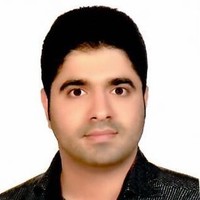
28 September 2021: IEEE PES Presentation on 'Estimation and Modelling Techniques for Real-time Frequency Stability Assessment in Low Inertia Power Systems'
The IEEE PES/PELS WA Chapter organised a talk by Julius Susanto and Alireza Fereidouni.
Many power systems across the world are experiencing a gradual decline in synchronous inertia levels as synchronous generators are increasingly being displaced by generation interfaced to the grid via power-electronic converters. As inertia levels decrease, the average frequency in the power system is subject to more severe and rapid fluctuations in response to active power disturbances, e.g. from generation or load contingencies. It is therefore becoming more crucial that i) estimates of system inertia are reliable and accurate, and ii) frequency stability can be assessed in real-time.
This presentation will describe the models and tools used for inertia estimation and real-time frequency stability assessments in the South West Interconnected System (SWIS), an islanded power system with declining levels of system inertia due to increasing renewable energy penetration.
About the Speakers
Julius Susanto is a Principal Engineer at the Australian Energy Market Operator (AEMO) in Perth, Western Australia. He received his Ph.D. Degree from Murdoch University, Australia, in Electrical Engineering and holds a Grad. Dip in Economics from the University of Western Australia. Julius is an IEEE Senior Member and Chartered Member of Engineers Australia (MIEAust CPEng), and is also a 2020 Churchill Fellow.
Alireza Fereidouni is a Senior Engineer at the Australian Energy Market Operator (AEMO) in Perth, Western Australia. He received his Ph.D. Degree from Curtin University, Australia, in Electrical Engineering and is an IEEE Member.

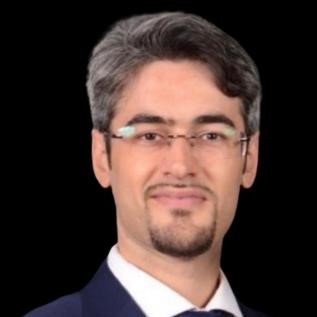
Date and Time
The talk was held on Tuesday 28 September 2021 from 4:30pm - 6:30pm Perth time (AWST) at Central Park Conference Centre in Perth, WA.
16 September 2021: IEEE PES Webinar on 'Power systems analysis, open source and the current challenges, the example of GridCal'
The IEEE PES/PELS WA Chapter organised a technical webinar by Santiago Peñate-Vera.
Our need to decarbonise all our production processes requires us, to come up with ways to substitute steady carbon-based generation (coal and gas) by variable renewable generation (wind and solar plus storage). The fast-paced developments required to meet the decarbonisation goals, forces us to shift from a comparably very simple planning process to a far more complex one based on large amounts of data and cutting-edge simulation and optimization methods. This requires researching and to re-invent many of the processes. For that, our best bet is open-source software. This presentation explores some of the current challenges in power system planning and how the use of open-source software provides a solution to many of these problems. Examples of open-source software, particularly GridCal and its evolution are shown to illustrate the concepts presented.
About the Speaker
Santiago is a senior power systems engineer at the planning department of Red Eléctrica de España (Spanish TSO) in Madrid, Spain. Santiago is M.Eng Industrial and Electrical engineer by the university of Las Palmas of Gran Canaria, Spain and MBA by the university of Barcelona, Spain. Santiago has worked as power systems consultant, SCADA software developer and Markets consultant. He has a number of contributions to the open-source community most notably GridCal.
Date and Time
The talk was held online on Thursday 16 September 2021 from 5:00pm - 6:30pm Perth time (AWST).
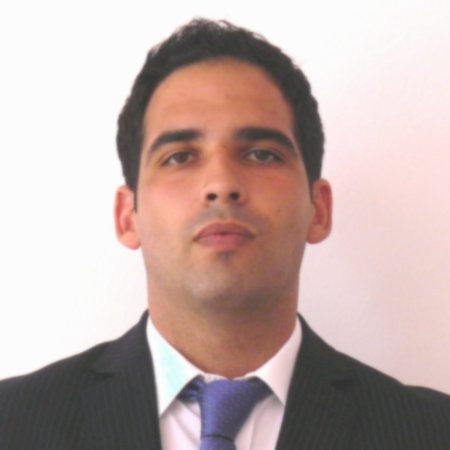
19 August 2021: IEEE PES Presentation on 'Electric Vehicles for Sustainable Developments with a European Perspective'
The IEEE PES organised a virtual talk by Professor Lina Bertling Tjernberg.
The energy system is in a global transition towards a sustainable society. Resource efficiency and environmental concerns push towards change into the use of renewable energy resources and to optimize the energy usage. This transition has been motivated by climate and energy goals and a growth in energy needs. The United Nations adapted a resolution for a sustainable development with 16 goals until 2030 and the European Commission has launched the targets towards 2030 of at least 27% renewable energy in final energy consumption at European level. New power grid developments include possibilities and challenges with generation, delivery, and usage of electricity as an integrated part of the energy system. This involves new forms of usage of electricity, for example, for transportation and demand response, and to the updating of existing electricity infrastructures. For electricity generation, the trend is toward new large-scale developments like offshore wind farms, as well as small-scale developments like rooftop solar energy. At the same time digitalization of society is creating new opportunities for control and automation as well as new business models and energy related services. Another key area for developments are the circular economics, which result in a new dimension for the life cycle cost assessment for all technical systems.
This presentation will focus on the introduction of the electrical vehicles (EVs). The EVs both contributes directly to the reduction of fossil fuel but also as a facilitator in the power grid. The presentation will share experience from the developments in Europe. “EV and PHEV sales in Europe continue to break records in 2020 with a 142% increase of deliveries to over 1,36 million registrations of plug-in vehicles, which is 11.4% of the total European car market, more than triple the share of 2019!
About the Speaker
Dr. Lina Bertling Tjernberg is a Professor in Power Grid Technology at KTH the Royal Institute of Technology, Stockholm, Sweden. She is the Director of the KTH Energy platform and is the Coordinator of Life-long learning at the School of Electrical Engineering and Computer Science. She was previously Professor at Chalmers University of Technology, 2009-2013, and with the National grid 2007-2009. She completed her Ph.D. in Electric Power Systems at KTH in 2002. Her research and teaching are focused on developments of the sustainable electric power grids with special interest in reliability analysis and asset management. She is senior member of IEEE and a Distinguished Lecturer of IEEE Power & Energy Society (PES). She has served as Secretary, respectively Treasurer of the IEEE PES Governing Board (2012-2016) and chair of the Sweden PES Chapter (2009-2019). She has been a member of the editorial board of the IEEE PES Transaction of Smart Grid, arranged the first PES ISGT Europe conference 2010, and is a member of the steering committee. She is a member of the Program Committee of the World Energy Council, the ISGAN Academy of Smart Grid, the National Committee of CIRED, and she is part of the expert pool for the EU commission. She is a candidate for the position as IEEE PES President elect 2021.
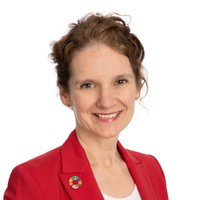
Date and Time
The lecture was held on Thursday 19 August 2021 from 5:00pm - 6:30pm Perth time.
6 August 2021: IEEE PES/PELS Prize for 2020
The IEEE PES/PELS prize is awarded to the Curtin student with the highest aggregate of marks in the two units ELEN3001 Power Systems Analysis and ETEN 3003 Power Electronics.
Congratulations to Li Shen, the prize winner for 2020!
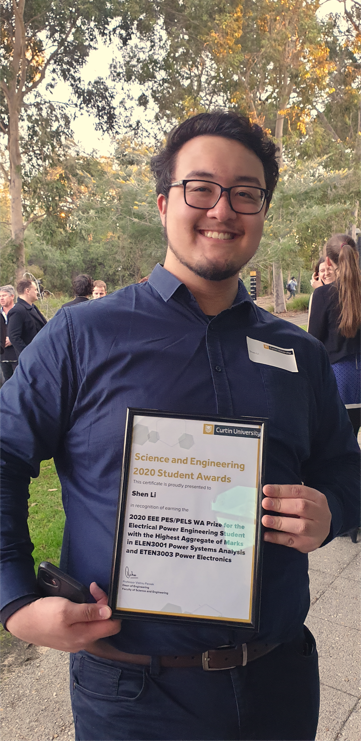
26 February 2021: IEEE PES Distinguished Lecture on 'Grid Reliabilty and its Vital Signs'
The IEEE PES Queensland Chapter is organising a virtual Distinguisged Lecture by PES President-Elect Dr Jessica Bian.
Frequency, voltage, customer interruption. What do these vital signs tell us about the bulk power system? Learn the grid health underlying the vital signs and how to accurately assess them. This lecture will explore reliability aspects of bulk power system so that you will develop a systematic, integrated understanding of how to assess the bulk power system reliability. Additional indicators include energy emergency alerts, transmission outage rates, protection system operations, and resource reserve margin. The presentation will also provide ranges, trends, and driving factors that influence changes in these indicators.
About the Speaker
Dr. Jessica Bian is a visionary leader and architect. She has spearheaded electric industry's reliability metrics and grid risk assessment. Currently she is the Vice President of Grid Services at Grid-X Partners. Before that, she was with the Federal Energy Regulatory Commission (FERC), Washington, DC. Previously, she was the Director of Performance Analysis at North American Electric Reliability Corporation (NERC) in Atlanta, Georgia. Under her leadership, a total of 18 industry-wide reliability indicators were established to determine grid reliability, adequacy, and associated risks. She is widely recognized as a pioneer and trusted world leader in the field.
Before joining NERC, Dr. Bian was with PJM, ERCOT and Westinghouse Electric. She earned her Ph.D. in Electrical Engineering from Tulane University and published over 70 articles. She volunteers at the IEEE Power & Energy Society (PES); was the Society Secretary from 2016 to 2019. She is the PES President-Elect for 2020-2021.
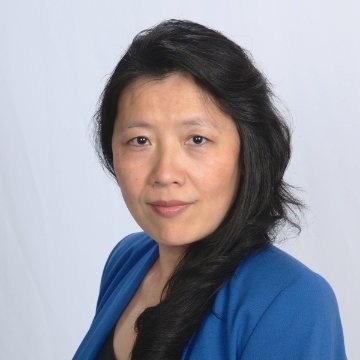
Registration
The lecture will be on Friday 26 February 2021 from 7am - 8am Perth time. Register at the link below before 25 February 2021:
August 2020: Outstanding WA PES/PELS Engineer 2019 - Award Presentation
The IEEE WA PES/PELS outstanding engineer award for 2019 was presented to Teresa Smit by Dean Sharafi on behalf of the WA Chapter.
